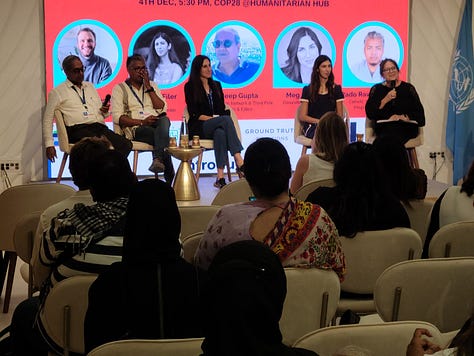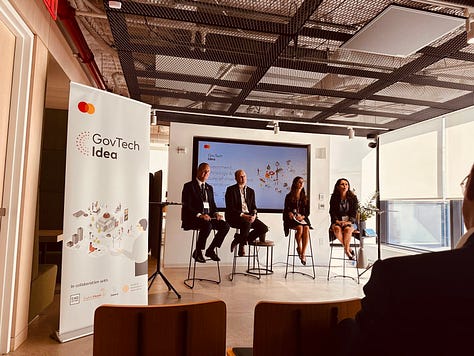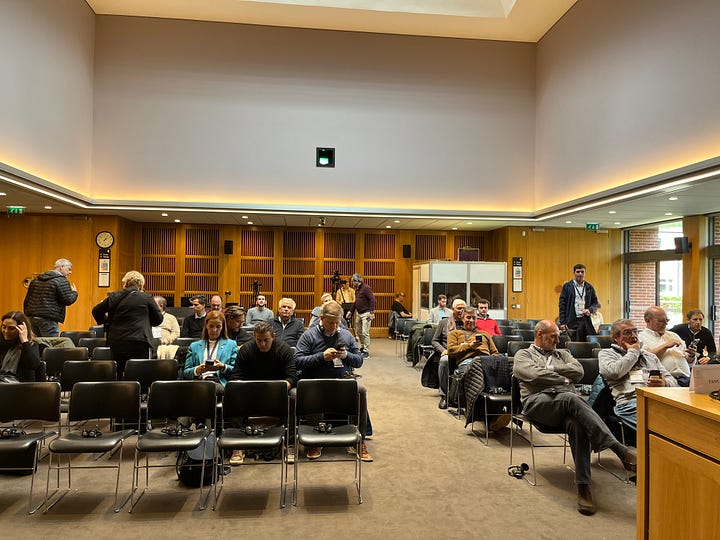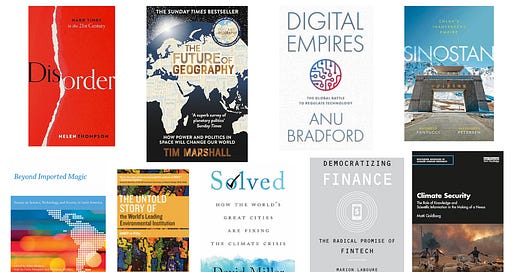The Public-Purpose Tech Holiday Library '23: The International Cooperation Edition
Emerging, bold ideas on the international cooperation we need to ensure that science and technology effectively address critical public needs worldwide.
Welcome to our third annual Public-Purpose Tech Holiday Library! Against the backdrop of the UN General Assembly this September, the Fall front cover of Foreign Policy magazine declared multilateralism “at a dead end”. Our processes and institutions of global cooperation are in a fragile state. Yet in light of major global shifts around technology and the climate crisis, they are as needed as ever before. If international cooperation is to produce breakthrough scientific and technological innovations and a global coherence that enables their use for public good, we urgently need innovations in international cooperation too.
What could “good”, creative international cooperation look like and offer on the substantive technology-related challenges and opportunities heading our way, from AI standard-setting to engaging new technologies for climate adaptation to combatting corruption? Multilateral Development Bank reform is one aspect. We are also seeing new institutional forms take shape, with countries increasingly turning to technology minilaterals - small groups of countries aligned by values or strategic purpose - as a speedier source of technology trade, governance, and security.
Against this backdrop, this year’s holiday library focuses on the books, podcasts, and papers making us think afresh about the future of international science and technology cooperation. They take as their focus space, cities, energy, and more. In true 2023 spirit, they’ve evoked in the StateUp team hope, excitement, and plenty of anxiety. We’re choosing to focus on hope, and on engaging our team and community to turn hope into action.
Books on Geopolitics and International Cooperation
Books that help us understand how the past, present, and future of geopolitics and international cooperation (and its breakdown) shape science, digital and emerging technologies, and our world’s shared resources
The Coming Geopolitics
In Disorder: Hard Times in the 21st Century (2022), Cambridge professor and podcaster Helen Thompson guides readers through the complex and intertwined histories of geopolitics, the global economy, and Western democracies. Thompson attributes much of the current turbulence to issues emerging from fossil-fuel energies. She suggests that challenges shaped by energy dynamics will persist through the ongoing green transition.
In Sinostan, China’s Inadvertent Empire (2022) Raffaello Pantucci and Alexandros Petersen discuss China’s infrastrucutural projects in its Central Asian sphere of influence, including the role of the Shanghai Cooperation Organisation and the emergence of the Digital Silk Road. This deeply researched study of Chinese geopolitics is full of colourful first-person encounters.
Tim Marshall’s The Future of Geography: How Power and Politics in Space Will Change Our World (2023) takes us beyond planet Earth to tell the story of the history and emerging geopolitics of space, and its profound potential consequences for humans, from drug discovery to international relations.
Climate
UNEP at 50: The Untold Story of the World’s Leading Environmental Institution (2021) by Maria Ivanova argues that the United Nations Environmental Program (UNEP), while less in the public eye than other international bodies, has already delivered on much of its founding promise and could be profoundly important to global understandings of nature, climate, and the environment for generations to come, serving as a global repository of climate knowledge.
At StateUp we are skittish about the idea of singular “solutions” being easily transposable the world over. Title aside, Solved: How the world’s great cities are fixing the climate crisis (2023) by David Miller delivers an important message about the rise of cities as global climate actors, and emphasises how lessons can be shared and scaled up both within and between them.
Technology as Regulatory Problem and Global “Solution”
Digital Empires: The Global Battle to Regulate Technology (2023) by Anu Bradford explores global tech regulation, comparing the American market-driven, Chinese state-driven, and European rights-driven models. Bradford analyses the contrasts in their strategies and the conflicts that arise when these approaches clash internationally.
Democratizing Finance: The radical promise of Fintech (2022) by Marion Laboure and Nicolas Deffrennes looks at the ways in which fintech might “disrupt” inequalities, ushering in, according to its authors, “the democratization of finance”. Avoiding out-and-out solutionism - the idea that technology alone can solve complex societal challenges - the book is one of the first to pay serious attention to the interplay between governments and financial technologies, from the perspective both of regulation and the opportunity for governments to adopt fintech to improve public services.
Whose Knowledge Counts?
Climate Security: The Role of Information and Scientific Knowledge in the Making of a Nexus (2023) by Matti Goldberg is a fascinating exploration into the climate-security nexus, where extreme climate impacts meet war and conflict, from Syria to Sudan. Goldberg makes the case that the international community must better integrate the knowledge and experiences of people on the frontlines of climate crisis into policymaking. We found this to be a pressing need while researching Silent Crisis.
Beyond Imported Magic (2014) is not a new book. But the volume, edited by MIT’s Eden Medina and colleagues, makes the still timely point that science and technology have their own histories, politics, and cultures in region’s around the world. We would do well to include them in global debate. Topics including the development of nuclear energy in Argentina, Mexico, and Chile make for important reading.
Events Re-cap
In 2023, we gathered experts from across sectors and disciplines to talk about international cooperation in relation to green technologies, climate change impacts, public-purpose technology, and AI and emerging technologies in Cambridge (England), Dubai, Vilnius, and New York respectively. We also launched WEBS, the international Water and Energy in Built Systems Innovation Alliance, supported by the British Council, to experiment with breaking down disciplinary and sectoral silos to decarbonising the built environment.
Highlights include:
Discussing government, technology, and international cooperation with Chris Meserole (Brookings), Sara Pantuliano (ODI), and Roby Senderowicz (World Bank Group) as a partner of the Mastercard GovTech Idea Forum during UNGA Week.
Against the backdrop of the agreement on the Loss and Damage Fund, joining Internews at COP28 to launch Silent Crisis, our deeply researched, multidisciplinary report on information and decision-making on the frontlines of climate change - and what governments, international organisations, and media outlets can do to create healthier information environments and provide resources needed today.
Bringing together an entrepreneur, an investor, a policymaker, and an economist to discuss the outsized role of Latin America in global climate resilience and adaptation with a high-level audience of senior policymakers, executives, and researchers, as we launched Green GovTech in Ibero-America, alongside our partners at CAF Development Bank, Fundación RAP, and Rumbo Ventures in Cambridge.
Lesson sharing on how governments can engage digital innovations to better serve citizens at GovTech Leaders 2023 in Lithuania.





Our case studies of communities on the frontlines of the climate crisis in Zimbabwe and Iraq point to the need to expand development of multi-directional information flows between local communities and national and international decision-making forums
.
Podcasts and Papers
Catch astronaut Tim Peake speak to Leading hosts Rory Stewart and Alastair Campbell on the geopolitics of space exploration and the focus on common goals, not divisive politics, that characterised his time at the European Space Agency.
Joining hosts Helen Thompson and Tom McTague on These Times, Pippa Malmgren uncovers how major powers are jostling for position in the Arctic.
In a new paper, State of Compute Access: How to Bridge the New Digital Divide, experts at the Tony Blair Institute for Global Change audit and analyse the compute ecosystem of 55 countries. They suggest that international development institutions create a Compute Development Fund to invest in countries with developing compute capabilities.
Can Challenge Prizes Scale Innovation?
Challenge prizes can play a unique and catalytic role in supporting the scaling stage of public-purpose innovation, unlocking social, economic, and environmental value. This innovation includes the green technologies (and other approaches) needed to tackle climate change and its impacts, alongside many other big societal risks that must be addressed at …
“The increased visibility and reputation that scaling prize participants enjoy may act as a catalyst for entering new markets and influencing relevant sectoral policies and regulations.” Scaling Innovation (2023)
Our Head of Research, Dr. Eszter Czibor, was lead author of our collaborative report with Challenge Works on the role of challenge prizes in scaling innovation in and across countries and regions.
The Atlantic Council’s series on the Three Seas Initiative (3SI) presents clear-eyed analysis of 3SI, one of a new breed of technology and infrastructure-focused minilaterals. 3SI seeks to bolster regional connectivity in Central and Eastern Europe to drive economic prosperity and strengthen European and transatlantic security through physical and digital infrastructure projects and investment.
International Tech Cooperation in 2024: What Experts Want
·We asked four experts in international technology cooperation what they hope to see happen in 2024. One word kept cropping up: miniliateralism. In a world marked by conflict, complexity and multilateral stagnation, small cooperative blocs of countries are burgeoning as models of international cooperation. Forums such as the G7, BRICS, and I2U2 offer a p…
What’s on your PPT holiday bookshelf? Let us know on LinkedIn, Twitter (#TheNewPPT) or via email.






